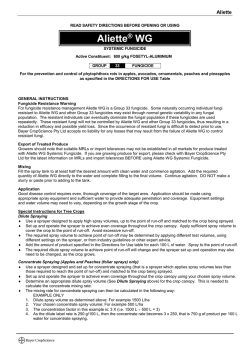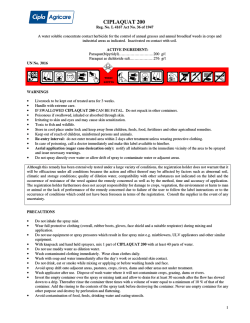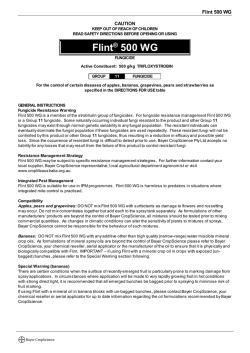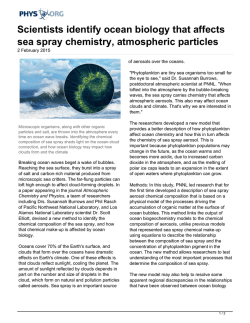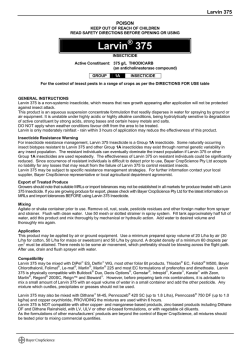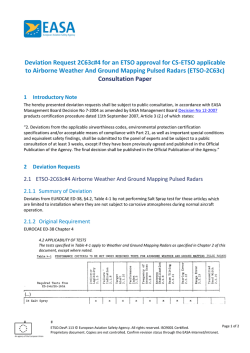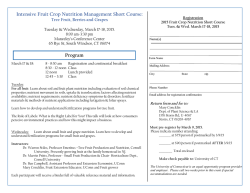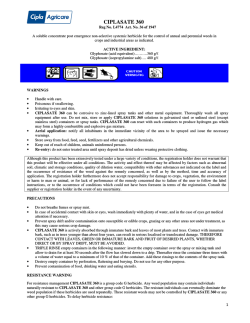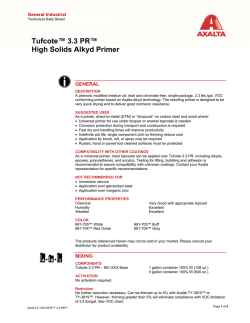
Label - Bayer CropScience
Calypso POISON KEEP OUT OF REACH OF CHILDREN READ SAFETY DIRECTIONS BEFORE OPENING OR USING Calypso® 480 SC INSECTICIDE Active Constituent: 480 g/L THIACLOPRID GROUP 4A INSECTICIDE For control of apple dimpling bug in apples, codling moth and oriental fruit moth in pome fruit and oriental fruit moth in stone fruit as specified in the DIRECTION FOR USE table GENERAL INSTRUCTIONS Insecticide Resistance Warning For insecticide resistance management, Calypso is a Group 4A insecticide. Some naturally occurring insect biotypes resistant to Calypso and other Group 4A insecticides may exist through normal genetic variability in any insect population. The resistant individuals can eventually dominate the insect population if Calypso and other Group 4A insecticides are used repeatedly. The effectiveness of Calypso on resistant individuals could be significantly reduced. Since occurrence of resistant individuals is difficult to detect prior to use, Bayer CropScience Pty Ltd accepts no liability for any losses that may result from the failure of Calypso to control resistant insects. Calypso may be subject to specific resistance management strategies. For further information contact your local supplier, Bayer CropScience representative or local agricultural department agronomist. Export Of Treated Produce Growers should note that suitable MRLs or import tolerances may not be established in all markets for fruit harvested from Calypso treated trees. If you are growing fruit for export, please check with Bayer CropScience for the latest information on MRLs and export tolerances before using Calypso. Mixing/Application Prior to pouring, shake container vigorously, then add the required quantity of Calypso 480 SC to water in the spray vat while stirring or with agitators in motion. Dilute Spraying ♦ Use a sprayer designed to apply high volumes of water up to the point of run-off and matched to the crop being sprayed. ♦ Set up and operate the sprayer to achieve even coverage throughout the crop canopy. Apply sufficient water to cover the crop to the point of run-off. Avoid excessive run-off. ♦ The required water volume may be determined by applying different test volumes, using different settings on the sprayer, from industry guidelines or expert advice. ♦ Add the amount of product specified in the Directions for Use table for each 100 L of water. Spray to the point of run-off. ♦ The required dilute spray volume will change and the sprayer set up and operation may also need to be changed, as the crop grows. Concentrate Spraying ♦ Use a sprayer designed and set up for concentrate spraying (that is a sprayer which applies water volumes less than those required to reach the point of run-off) and matched to the crop being sprayed. ♦ Set up and operate the sprayer to achieve even coverage throughout the crop canopy using your chosen water volume. ♦ Determine an appropriate dilute spray volume (See Dilute Spraying above) for the crop canopy. This is needed to calculate the concentrate mixing rate. ♦ The mixing rate for concentrate spraying can then be calculated in the following way: EXAMPLE ONLY 1. Dilute spray volume as determined above: For example 1500 L/ha 2. Your chosen concentrate spray volume: For example 500 L/ha 3. The concentration factor in this example is: 3 X (ie 1500 L ÷ 500 L = 3) 4. As the dilute label rate is 37.5 mL/100 L, then the concentrate rate becomes 3 x 37.5, that is 112.5 mL/100 L of concentrate spray. ♦ The chosen spray volume, amount of product per 100 L of water, and the sprayer set up and operation may need to be changed as the crop grows. ♦ Do not use concentrate spraying for control of apple dimpling bug in apples. ♦ Do not use a concentrate rate higher than that specified in the Critical Comments. ♦ For further information on concentrate spraying, users are advised to consult relevant industry guidelines, undertake appropriate competency training and follow industry Best Practices. Calypso Minimising Spray Drift It is desirable to minimise spray drift onto adjoining pasture to limit the potential for chemical residues in grazing livestock. An effective way to reduce drift potential is to apply as large droplets as possible, ie a spray with a volume mean diameter greater than 150 microns. Higher pressure will also reduce droplet size and increase spray drift potential. When higher spray volumes are required, use high capacity nozzles instead of increasing the pressure. Application in conditions such as no wind or strong winds and hot dry conditions will also have a considerable effect on increasing the potential for spray drift. Avoid directing excessive spray above trees and always turn off outward pointing nozzles at end rows and outer rows. PRECAUTION Re-entry Do not allow entry into treated areas until the spray has dried. When prior entry is necessary, wear cotton overalls buttoned to the neck and wrist (or equivalent clothing) and chemical resistant gloves. Clothing must be laundered after each day's use. PROTECTION OF LIVESTOCK Assess the treatment area before application to identify any potential for spray drift to grazing pasture. Employ a spraydrift minimisation strategy to avoid drift onto adjoining properties or stock areas. If unexpected conditions cause spray drift to land that could potentially be used for grazing by livestock seek advice from Bayer CropScience. Bees: Calypso presents a low hazard to bees, however in line with good agricultural practice application should be avoided when bees are actively foraging. PROTECTION OF WILDLIFE, FISH, CRUSTACEANS AND ENVIRONMENT This product is very highly toxic to aquatic invertebrates. DO NOT contaminate streams, rivers or waterways with the chemical or used containers. Calypso may have adverse effects on some non-target insects or other arthropods. For further information contact Bayer CropScience. DO NOT apply under weather conditions, or from spraying equipment, that may cause spray to drift onto nearby adjacent areas, particularly wetlands, waterbodies or watercourses. DO NOT spray within 40 metres upwind of wetlands, waterbodies or watercourses. DO NOT apply if heavy rains are expected within 24 hours. STORAGE AND DISPOSAL Store in the closed, original container in a cool, well ventilated area. Do not store for prolonged periods in direct sunlight. Triple or preferably pressure rinse container before disposal. Add rinsings to spray tank. Do not dispose of undiluted chemicals on site. If recycling, replace cap and return clean containers to recycler or designated collection point. If not recycling, break, crush or puncture and bury empty containers in a local authority landfill. If no landfill is available, bury the containers below 500 mm in a disposal pit specifically marked and set up for this purpose clear of waterways, desirable vegetation and tree roots. Empty containers and product should not be burnt. Do not re-use empty container for any other purpose. SAFETY DIRECTIONS Poisonous if swallowed. When opening the container and preparing spray, wear cotton overalls buttoned to the neck and wrist (or equivalent clothing), elbow-length PVC or nitrile gloves and a disposable fume mask. When using the prepared spray, wear cotton overalls buttoned to the neck and wrist (or equivalent clothing) and elbow-length PVC or nitrile gloves. Wash hands after use. After each day’s use wash gloves and contaminated clothing. FIRST AID If poisoning occurs contact a doctor or Poisons Information Centre (telephone 131126). MATERIAL SAFETY DATA SHEET Additional information is listed in the Material Safety Data Sheet which can be obtained from www.bayercropscience.com.au. EXCLUSION OF LIABILITY This product must be used strictly as directed, and in accordance with all instructions appearing on the label and in other reference material. So far as it is lawfully able to do so, Bayer CropScience Pty Ltd accepts no liability or responsibility for loss or damage arising from failure to follow such directions and instructions. Calypso® is a Registered Trademark of Bayer. APVMA Approval No.: 53203/0507 PESTICIDE, LIQUID, TOXIC, N.O.S (contains thiacloprid) UN No. 2902 PG III HAZCHEM 2X FOR 24 HOUR SPECIALIST ADVICE IN EMERGENCY ONLY PHONE 1800 033 111 Calypso DIRECTIONS FOR USE CROP Apples PEST Apple dimpling bug RATE Dilute spraying 37.5 mL/100 L Pome fruit Codling moth, Oriental fruit moth Dilute spraying 37.5 mL/100 L Concentrate spraying Refer to the Mixing/ Application section CRITICAL COMMENTS Correctly timed applications of Calypso will significantly reduce fruit damage caused by apple dimpling bug, however a substantial reduction in pest numbers may not always be evident. Apply an initial spray from pink stage to petal fall when pest numbers reach accepted threshold levels as indicated by monitoring. Spray thoroughly to ensure complete coverage of flower parts and developing fruitlets, using dilute spraying equipment (concentrate spraying is not appropriate for this use). A second spray (up to a total of two Calypso applications during flowering) and/or other control measures may be necessary under high pest pressure. Codling moth Apply a total of 4 sprays at 14 day intervals commencing at egg lay (110 degree days) of the first generation as indicated by monitoring. For the remainder of the season, continue to use other control measures. Do not apply more than 4 Calypso sprays per season (this does not include prior use of up to 2 applications of Calypso for apple dimpling bug control). Control of the second generation of oriental fruit moth may be achieved by the Calypso applications targeting codling moth where populations of these pests coincide. Oriental fruit moth For specific control of an oriental fruit moth generation apply 3 Calypso sprays at 14 day intervals commencing at egg hatch as indicated by monitoring. For the remainder of the season, continue to use other control measures. Do not use this program before or after a program of Calypso applications for codling moth control, as no more than 4 Calypso sprays should be applied per season (this does not include prior use of up to 2 applications of Calypso for apple dimpling bug control). Application Apply thoroughly to ensure complete coverage. Apply by dilute or concentrate spraying equipment. Apply the same total amount of product to the target crop whether applying this product by dilute or concentrate spraying methods. For concentrate spraying, do not use at rates greater than 112.5 mL per 100 L of water (i.e. at a concentration factor greater than 3X). Stone fruit Oriental fruit moth Dilute spraying 37.5 mL/100 L Concentrate spraying Refer to the Mixing/ Application section Woolly aphid When Calypso is used for the control of codling moth or oriental fruit moth as indicated, early season sprays for the control of woolly aphid will not be required. For the remainder of the season, monitor aphid populations and apply other control measures as required. Apply in a series of 3 sprays at 14 day intervals commencing at egg hatch of a generational peak as indicated by monitoring. Apply thoroughly to ensure complete coverage. For the remainder of the season, continue to use other control measures. Do not apply more than 3 Calypso sprays per season. Apply by dilute or concentrate spraying equipment. Apply the same total amount of product to the target crop whether applying this product by dilute or concentrate spraying methods. For concentrate spraying, do not use at rates greater than 112.5 mL per 100 L of water (i.e. at a concentration factor greater than 3X). Add a non-ionic wetting agent at 10 mL/100 L regardless of whether applying by dilute or concentrate spraying. Green peach aphid: Where Calypso is used for the control of oriental fruit moth as indicated, sprays for the control of green peach aphid will not be required. NOT TO BE USED FOR ANY PURPOSE, OR IN ANY MANNER, CONTRARY TO THIS LABEL UNLESS AUTHORISED UNDER APPROPRIATE LEGISLATION DO NOT APPLY BY AIRCRAFT WITHHOLDING PERIODS Stone fruit (excluding peaches): DO NOT HARVEST FOR 14 DAYS AFTER APPLICATION Peaches and pome fruit: DO NOT HARVEST FOR 21 DAYS AFTER APPLICATION DO NOT GRAZE ANY PLANTS THAT WERE PRESENT IN THE SPRAYED AREA AT THE TIME OF APPLICATION Calypso
© Copyright 2026
